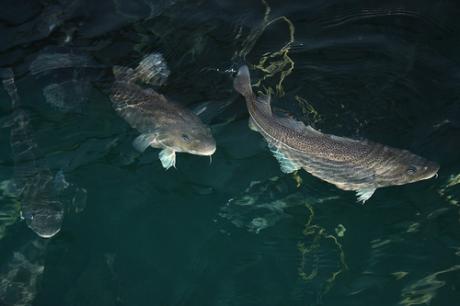Mapping Suspended Organic Particles from Salmon Farms
Salmon fish farms are proliferating. The open nature of many such aquaculture systems impact the surrounding sea, not least by releasing particles of organic matter.

Farmed Salmon release organic particles into the sea, polluting the waters. Excessive nutrients can contribute to toxic algal blooms which may poison marine animals. The blooms also deplete oxygen which can directly kill sealife. Image: Norsk Havbrukssenter/CC BY-SA 2.0
One approach to this problem is to farm shellfish like mussels or oysters nearby to feed on the organic particles. In Asia this is a centuries old practice, but is it always a good idea?
Researcher Lindsay M Brager has been investigating the potential for this type of multitrophic aquaculture in Fundy Bay in Canada.
Brager mapped the spread of particulate matter from two salmon farms. She used several sensors, including
- a transmissometer to measure the optical properties of the water,
- a flurometer to measure the chlorophyll a content of particles,
- a CTD to measure conductivity, temperature and depth,
- and a current meter to measure average current speed and direction.
She towed the sensors at undulating depths between 0.5 and 10 m at 2 m sec -1. On-board the boat she used Windmill software to combine the sensor data stream with simultaneous GPS readings.
After data collection Brager produced contour maps to summarise and observe spatial patterns of particulate matter concentrations.
Fundy Bay has strong tidal currents which mix the water. The Windmill software helped Brager determine that suspended solids rarely reached levels outside the natural range of concentrations existing in that area. This conflicts with research in other regions. Her results showed that concentrations of particulates around salmon farms vary greatly depending upon where the farms are located. In areas where the organic matter from fish farms was widely dispersed, the co-culture of bivalves and fish wouldn't deal with the waste stream.
The Windmill software to collect GPS and other measurements is currently reduced to £50 from Windmill Software Limited.
Further Reading:
Brager, L. M. (2013). Spatial and Temporal Dynamics of Suspended Particulate Matter Surrounding Finfish Farms on the East and West Coasts of Canada.
